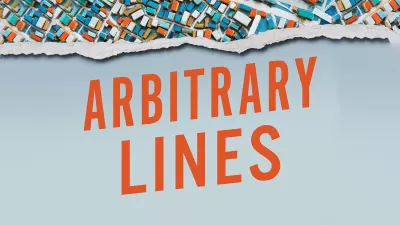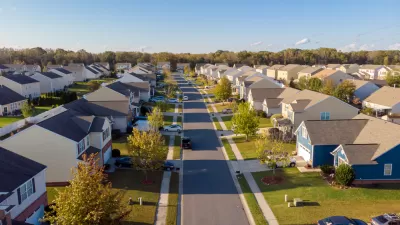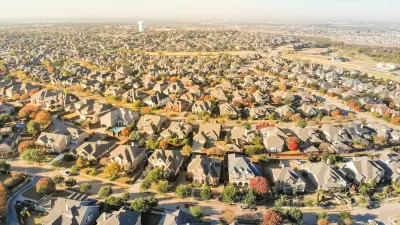Author M. Nolan Gray and Planetizen Editorial Director James Brasuell recently discussed zoning abolition and other concepts discussed in Gray's book, "Arbitrary Lines," published recently by Island Press.
The discussion recorded for the video above, between M. Nolan Gray and James Brasuell, digs into the key concepts and critiques presented in the newly published book, Arbitrary Lines: How Zoning Broke the American City and How to Fix It.
As noted by Brasuell early in the discussion, Arbitrary Lines takes a significant step beyond the work of previous books that have introduced criticism of U.S. zoning codes by proposing the end of zoning. Gray explains four key critiques of zoning and its outcomes—criticisms that are under-appreciated and misunderstood even by many in the planning profession. The discussion also gets into the details of how Gray believes land use regulation can continue after the end of zoning.
For more background on the book, see also an excerpt published by Planetizen as well as a book review written by Planetizen blogger Michael Lewyn.
FULL STORY: Arbitrary Lines Nolan Gray's Conversation with Planetizen

Study: Maui’s Plan to Convert Vacation Rentals to Long-Term Housing Could Cause Nearly $1 Billion Economic Loss
The plan would reduce visitor accommodation by 25,% resulting in 1,900 jobs lost.

North Texas Transit Leaders Tout Benefits of TOD for Growing Region
At a summit focused on transit-oriented development, policymakers discussed how North Texas’ expanded light rail system can serve as a tool for economic growth.

Using Old Oil and Gas Wells for Green Energy Storage
Penn State researchers have found that repurposing abandoned oil and gas wells for geothermal-assisted compressed-air energy storage can boost efficiency, reduce environmental risks, and support clean energy and job transitions.

Private Donations Propel Early Restoration of Palisades Playground
Los Angeles has secured over $1.3 million in private funding to restore the Pacific Palisades playground months ahead of schedule, creating a modern, accessible space that supports community healing after recent wildfires.

From Blight to Benefit: Early Results From California’s Equitable Cleanup Program
The Equitable Community Revitalization Grant (ECRG) program is reshaping brownfield redevelopment by prioritizing projects in low-income and environmental justice communities, emphasizing equity, transparency, and community benefits.

Planting Relief: Tackling Las Vegas Heat One Tree at a Time
Nevada Plants, a Las Vegas-based nonprofit, is combating the city’s extreme urban heat by giving away trees to residents in underserved neighborhoods, promoting shade, sustainability, and community health.
Urban Design for Planners 1: Software Tools
This six-course series explores essential urban design concepts using open source software and equips planners with the tools they need to participate fully in the urban design process.
Planning for Universal Design
Learn the tools for implementing Universal Design in planning regulations.
Ascent Environmental
Borough of Carlisle
Institute for Housing and Urban Development Studies (IHS)
City of Grandview
Harvard GSD Executive Education
Toledo-Lucas County Plan Commissions
Salt Lake City
NYU Wagner Graduate School of Public Service





























